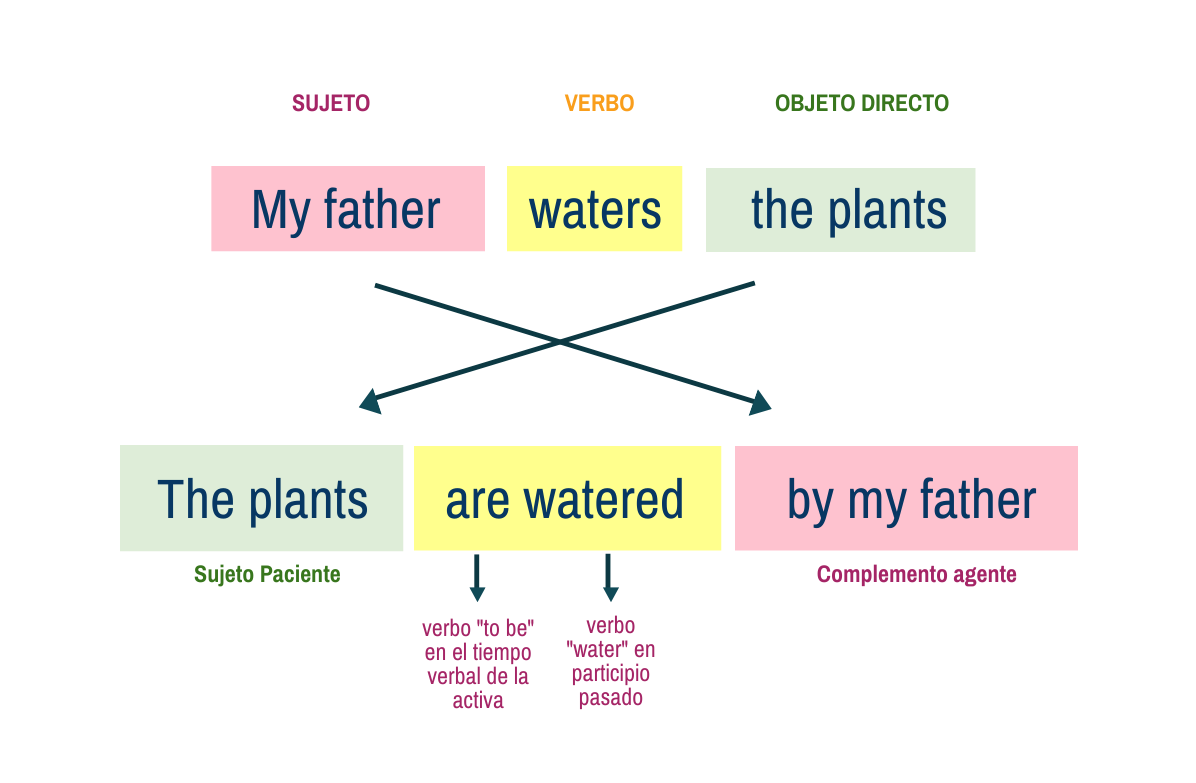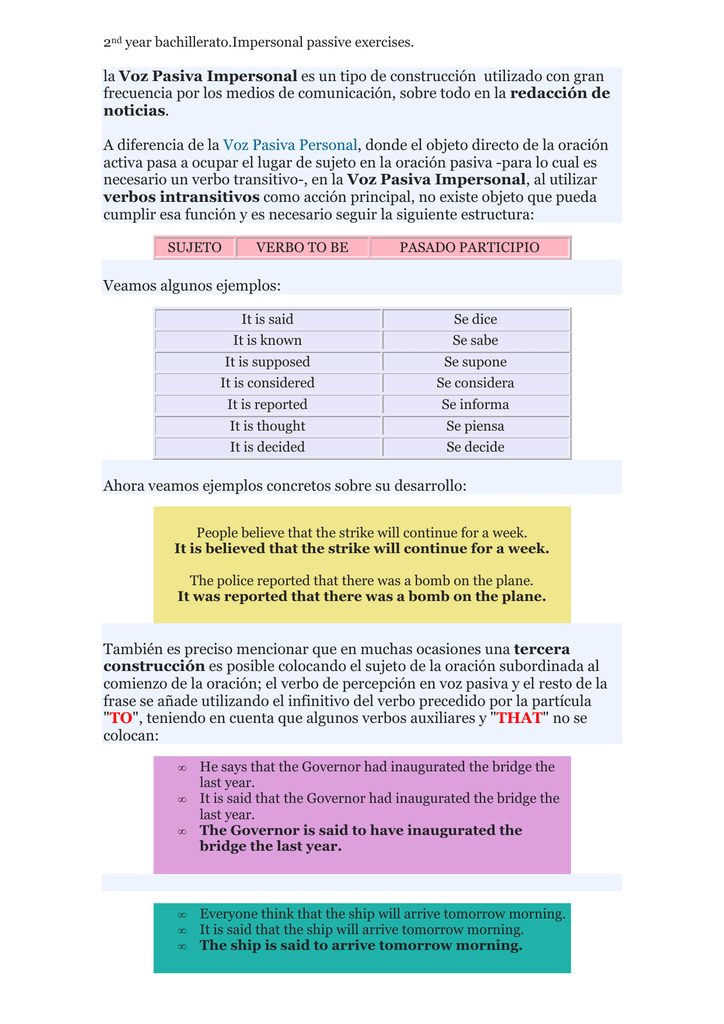
Pasiva Impersonal en Inglés ¿Cómo y Cuándo se usa? [2023]
How to make the Passive in English We make the passive by putting the verb 'to be' into whatever tense we need and then adding the past participle. For regular verbs, we make the past participle by adding 'ed' to the infinitive. So play becomes played. Click here to learn about irregular verbs . Practise with these exercises Verbs with two objects

Pasiva impersonal en inglés ¿Cómo es y cómo se usa?
Transforma las oraciones de dos maneras: primero en pasiva impersonal y segundo en pasiva personal. Ejemplo: They think that he earns a lot of money. [Creen que gana mucho dinero.] → It is thought that he earns a lot of money. [Se cree que gana mucho dinero.] → He is thought to earn a lot of money.

Passive Voice & Impersonal Passive Voice YouTube
- Empezamos nuestra Impersonal Passive por el segundo sujeto, que es el que más importancia tiene. - Transformamos el reporting verb a pasiva de nuevo. - Añadimos TO. - Analizamos el tiempo verbal de la acción principal y miramos nuestra magic box. People believe that this lawyer is very professional. This lawyer is believed to be very.

¿Cómo Utilizar La Pasiva Impersonal En Inglés De Manera Efectiva? Fanática del Cine
Pasivas impersonales en inglés - Ejercicio 9 Descripción: Pasiva en inglés - Ejercicio 9. Escribe las siguientes oraciones en voz pasiva. Después comprueba tus respuestas. Puedes acceder a la explicación en español o en inglés. Siguiente ejercicio Pasiva - Ejercicio 9 Download PASSIVE-VOICE---IMPERSONAL-PASSIVE---EXE

Impersonal Passive Passive Voice Personal Passive FCE Cambridge English English vocabulary
¿En qué consiste la pasiva impersonal en inglés? Algo muy curioso e importante a tener en cuenta para entender este tema es que en el inglés las oraciones pasivas no están formuladas para que el sujeto sea quien realiza la acción.

El Inglés y su Voz Pasiva【EJEMPLOS, LO MEJOR DEL 2022】
Exercises: Impersonal passive and reflexive passive sentences I Ejercicios de pasiva impersonal y pasiva reflexiva I Impersonal passive. Completa las siguientes oraciones con los verbos en el tiempo verbal indicado entre paréntesis. 1 It (expect -simple present) that the weather will change in two weeks. It's (is) expected that…

Impersonal Passive Passive Voice Personal Passive FCE Cambridge English Key Word Transformation
Personal passive. 1. Form: subject + passive verb + to-infinitive. active: People know Susan is a car thief. impersonal passive: It is known that Susan is a car thief. personal Passive: Susan is known to be a car thief. 2. Form: subject + passive verb + perfect infinitive. active: People know Susan has stolen the car.

IMPERSONAL PASSIVE PASIVA IMPERSONAL Inglés Gramática YouTube
1. Empezamos con "It" + "be" (en el mismo tiempo que el verbo activo) + el participio del verbo principal + (that) + oración. Ejemplo: People say (that) Alberto works hard. It is said (that) Alberto works hard. Se dice / Dicen que Alberto trabaja duro. Verbos:

La voz pasiva en inglés
IMPERSONAL PASSIVE. People know that she is a good swimmer. They say that Francis is in hospital. They think that the children are in bed. People believe that the robber has worked in the bank. People believe that nuclear power stations are dangerous. His collegues thought that he was on holiday.

Pasivas impersonales en inglés Ejercicios inglés online
¿Qué son las pasivas impersonales en inglés? Son tipo de pasiva en inglés que no tiene equivalente en español. La usamos con determinados verbos como say, think, believe, know, rumour. El significado es el de referirnos a lo que la gente en general dice, piensa, cree, sabe, rumorea, etc.

IMPERSONAL PASSIVES en inglés Explicación con ejemplos y ejercicios YouTube
Passive Grammar - the basics. This is a worksheet that provides an overview of the basic passive structures, the rules and tense exercises. It also includes a speaking activity. A nice lesson to revise the basic structures and use of the passive. Level ***** [ B1/B2] Free Download. x.

La pasiva en inglés cómo se forma y cuáles son sus usos
We use the personal and impersonal passive to express other people`s opinions. We can use the impersonal passive to avoid mentioning the identity of the agent. We usually do this by using reporting verbs (including say, think, believe, know, etc.) preceded by the dummy subject "it" , as in : It is said that, it is thought that, etc.

Pasivas impersonales en inglés Ejercicios inglés online
IMPERSONAL PASSIVE - PASIVA IMPERSONAL | Inglés | Gramática The English Spotlight 26K subscribers 535 12K views 2 years ago GRAMMAR En este video vamos a ver la pasiva impersonal -.

Voz Pasiva Y Activa En Ingles Ejemplos Simptome Blog
IMPERSONAL PASSIVES en inglés - Explicación con ejemplos y ejercicios - YouTube Ey! Hoy te explico cómo utilizar la estructura IMPERSONAL PASSIVE en inglés con muchos ejemplos.Te dejo la web.

CLASE 24 PASIVA EN INGLÉS PARTE II PASIVA IMPERSONAL YouTube
📌PASIVA IMPERSONAL en inglés - nivel B2/C1. Sube de nivel entendiendo cómo funciona la pasiva impersonal para crear frases objetivas y académicas en inglés..

¿Cómo Utilizar La Pasiva Impersonal En Inglés De Manera Efectiva? Fanática del Cine
1. Personal Passive. When we put an object of an active sentence into passive, it becomes subject of the passive sentence.. Active sentence → The professor gave the students the books.; Passive sentence → The students were given the books.; We sometimes use a pronoun for the students or the books in its subject form (here: they).. Active sentence → The professor gave them the books.